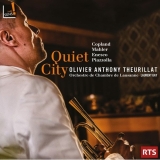 Aaron Copland: Quiet City; Alan Hovhaness: Haroutiun (Resurrection) op. 71 (Aria) + Prayer of Saint Gregory; Henri Duparc: Mélodies (La Vie antérieure); Vincent Persichetti: The Hollow Men; Modest Mussorgsky/Maurice Ravel: Il Vecchio Castello; Gustav Mahler: Blumine; Georges Enesco: Légende (Orchestration: Richard Dubugnon); Astor Piazzolla: Adios Nonino (Arr: Richard Dubugnon); Leroy Anderson: A Trumpeter's Lullaby; Olivier Anthony Theurillat, Trompete, Orchestre de Chambre de Lausanne, Laurent Gay; 1 CD Indésens INDE146; Aufnahme o.A., Veröffentlichung 12/03/2021 (58'21) – Rezension von Remy Franck
Aaron Copland: Quiet City; Alan Hovhaness: Haroutiun (Resurrection) op. 71 (Aria) + Prayer of Saint Gregory; Henri Duparc: Mélodies (La Vie antérieure); Vincent Persichetti: The Hollow Men; Modest Mussorgsky/Maurice Ravel: Il Vecchio Castello; Gustav Mahler: Blumine; Georges Enesco: Légende (Orchestration: Richard Dubugnon); Astor Piazzolla: Adios Nonino (Arr: Richard Dubugnon); Leroy Anderson: A Trumpeter's Lullaby; Olivier Anthony Theurillat, Trompete, Orchestre de Chambre de Lausanne, Laurent Gay; 1 CD Indésens INDE146; Aufnahme o.A., Veröffentlichung 12/03/2021 (58'21) – Rezension von Remy Franck

Der 1971 geborene Schweizer Trompeter Olivier Anthony Theurillat legt bei Indésens ein sehr gemischtes Programm vor, das er mit jenem Orchester aufnahm, in dem er von 1996 bis 2002 Solotrompeter war, dem Orchestre de Chambre de Lausanne. Positiv zu vermerken ist auf Anhieb, dass dieses Programm nicht wieder einmal dieselben Stücke beinhaltet, die Trompeter gerne aufnehmen, sondern für Abwechslung in diesem Bereich sorgt. Es ging Theurillat dabei sicher nicht um Virtuosität und spektakulären Glanz, eher um Kantabilität und Gefühlsausdruck. Davon gibt es reichlich, und sowohl der Solist als auch das Orchester unter der Leitung von Laurent Gay spielen ebenso souverän wie eingebungsreich und zeigen überall ein besonders feinsinniges Gespür für klangliche Entwicklungen.
Am Ende stellt man fest, dass Theurillat eine besonders glückliche Hand bei der Programmauswahl hatte, denn die Platte ergibt trotz sehr unterschiedlicher Komponisten ein kohärentes Ganzes.
Swiss trumpeter Olivier Anthony Theurillat, born in 1971, presents a very mixed program on Indésens, which he recorded with the orchestra in which he was principal trumpet from 1996 to 2002, the Orchestre de Chambre de Lausanne. One positive thing to note right away is that this program does not contain again the same pieces that trumpeters like to record, but rather provides variety in this area. Theurillat was certainly not concerned with virtuosity and spectacular brilliance, but rather with cantabile and emotional expression. There is plenty of that, and both the soloist and the orchestra under the direction of Laurent Gay play with as much assurance as involvement, showing a particularly subtle sense of tonal development throughout.
In the end, one realizes that Theurillat had a particularly lucky hand in the program selection, for, despite very different composers, the disc is coherent.






















